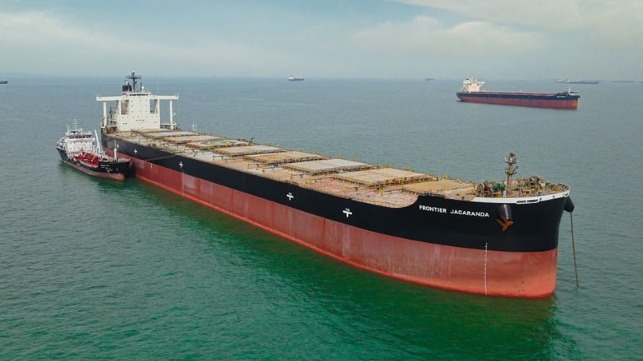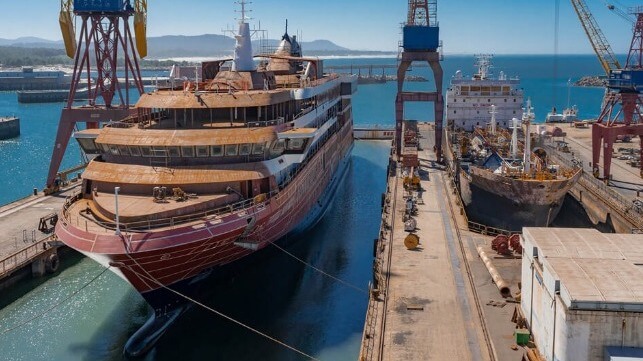NYK Plans Full-Scale Biofuel Trial Over Longer Period Validating Stability

NYK will conduct full-scale trials of long-term use of biofuels starting in 2024 as the company looks to advance on its goals for reducing carbon emissions. The latest program comes as a progressive series of tests expanding the use of biofuel in partnership with its shipping customers.
“Moving forward from the previous short-term trials, NYK will comprehensively verify the safety and stable procurement of biofuels when used over a long period. Through this trial, NYK will establish a safe navigation system using biofuels and promote biofuel development,” according to the company’s announcement.
In this trial, NYK will use biofuel continuously for three months on multiple vessel types. After that, NYK will gradually extend biofuel use for a longer period for further validation. This test will explore the impact of extending the length of use of the fuel and issues such as storage of the fuel.
NYK highlights that while it has confirmed the safety of short-term biofuel use, it has not verified the impact of biofuels on the ship’s main engine, generator, motor, fuel supply system, etc. One of the key points they will be exploring is the quality of biofuels after a certain storage period.
Since fiscal 2019, the NYK Group has conducted short-term biofuel trials on about 10 vessels. NYK also needed to ensure the stability of biofuel procurement when used in more vessels.
The testing of biofuel has advanced since the first trial in 2019 when they tried biofuel on a dry bulk carrier Frontier Sky while the vessel was docked in Rotterdam. Working with shippers Anglo American and biofuel supplier Toyota Tsusho, they ran a longer test loading the fuel in Singapore aboard the bulk carrier Frontier Jacaranda for a voyage to South Africa in June 2021. A third bulk carrier, Frontier Sky, conducted a trial voyage from Singapore to India in November 2021.
Last year, NYK expanded the trials including operating a round trip between Singapore and South Africa aboard a Capesize bulker named Friendship. That test confirmed that biofuel can result in up to a 10 percent CO2 emissions reduction compared to conventional marine fuel.
NYK working with Shin-Nippon Kaiyosha which operates tugboats launched the first test of 100 percent concentration biodiesel on a ship. Starting in July 2022 they tested navigation on the higher concentration of biodiesel.
The upcoming test looks to extend the previous experience by increasing the period during which biofuel is used on the ship as well as involving an increasing number and type of vessels. It is a key part of the company’s goal to cut emissions by 45 percent from 2021 level by 2030.
Japan’s First Mega-Yacht Cruise Ship Ordered and Will be Built in Portugal

The expansion of Japan’s cruise ship market is continuing with the news that a new mega-yacht cruise ship has been ordered. Traditionally marketing domestically to Japanese travelers, the cruise sector is seeing new growth in Japan as both NYK and Mitsui O.S.K. launched new investments while niche operators such as Peace Boat added a newer cruise ship.
The luxury mega-yacht was ordered last week by Japan’s Ryobi Holdings, a diversified company that includes operations in transportation and tourism. The transport group currently operates ferries and excursion boats as well as buses and a tour company.
“We plan to offer a different kind of cruise life experience, such as enjoying a visit to a remote island on a small boat,” writes Ryobi announcing its first cruise ship order. They explained that their plan will be Japan’s first yacht-style passenger ship. It will have features common in this sector including a marina in the stern for water activities, which will be the first on a newbuild in the Japanese market. MOL will also be introducing this feature when it takes over a cruise ship in 2024 acquired from Carnival Corporation’s Seabourn Cruises.
Ryobi has contracted West Sea – Viana Shipyard, a Portuguese shipbuilder started just a decade ago. The company has built river cruise ships for several of the major brands and starting in 2018 entered the ocean-going segment building luxury exploration cruise ships. West Sea is building a total of seven 9,900 gross ton cruise ships for a Portuguese company Mystic Cruises. Starting with the World Explorer in 2019, the ships are 413 feet (126 meters) with luxury accommodations for 200 passengers, The first of the ships are operating under charter while Mystic also launched Atlas Ocean Voyages to market its exploration cruises.
Ryobi reports that the ship will be approximately 360 to 390 feet (110 to 120 meters) in length and 9,000 to 10,000 gross tons, making it similar in size to the Mystic cruise ships. The plan is for just 60 staterooms with accommodations for 120 passengers plus 100 in crew.
The design will emphasize luxury and hospitality with the idea being that each passenger can feel like the owner of a mega-yacht. The cruise ship will operate mainly in Japan and southwest Asia.
The new Japanese cruise ship will be built at the Viana do Castelo shipyard and is scheduled for delivery in 2027. West Sea is valuing the order at around €100 million.
The concept of modern mega-yacht cruise ships was launched as the cruise industry developed with the first new ships known as the Sea Goddesses launched in the mid-1980s. The niche market has continued to grow and was elevated by Scenic Cruises which recently built two mega-yacht style luxury cruise ships as well as two similar ships for its Emerald Cruises brand. These ships are marketed internationally and will now be joined by the Ryobi ship.
The Japanese cruise market is seeing a resurgence with NYK building a 52,200 gross ton cruise ship Asuka III at Meyer Werft, while MOL is using the ship acquired from Carnival Corp. to launch a new international cruise operation. MOL has also reported plans to build cruise ships for the Japanese market. The major international cruise brands also operate cruises marketed to Japan which is seen as a growing market for leisure travel.
No comments:
Post a Comment